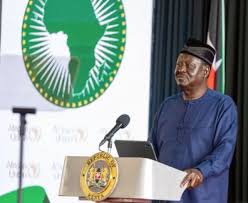BY DENNIS WECHE.
Raila Odinga’s candidacy for the African Union Commission chairmanship is unfolding at a critical time for the African continent, particularly with the ongoing conflict in the Democratic Republic of Congo (DRC).
The war in the eastern DRC, characterized by intense clashes between government forces, rebel groups such as the M23, and the involvement of various regional powers, has exacerbated divisions within the African Union (AU).
For Odinga, who has long positioned himself as a Pan-African leader committed to unity and diplomacy, the DRC conflict presents both a challenge and an opportunity that could shape his chances of securing the AU’s top position.
The election for the African Union Commission Chairperson is set to take place this month, February 2025, during the 38th AU Summit in Addis Ababa, Ethiopia. The election will determine the successor to the current Chairperson, Moussa Faki, and is expected to be a closely contested battle.
The process will involve a secret ballot, with a two-thirds majority required from the 55 AU member states to elect the new Chairperson. Odinga has gained considerable support from various African nations, including Algeria, Angola, Burundi, the Democratic Republic of the Congo, Ghana, Nigeria, Rwanda, South Africa, and Uganda.
However, as the DRC conflict continues to escalate, it could alter diplomatic dynamics and potentially impact the election in unexpected ways.
Odinga is not alone in the race for the position. Mahamoud Ali Youssouf, the long-serving Foreign Minister of Djibouti, has entered the competition. Youssouf brings over 20 years of diplomatic experience, and his candidacy has been backed by the Djibouti presidency, which touts his expertise in African affairs.
Additionally, Richard Randriamandrato, Madagascar’s former Foreign Minister, has also joined the race, providing further competition to Odinga. With such strong contenders, Odinga faces significant challenges in securing the position, making the next few weeks crucial for his campaign.
The DRC war has already become a point of contention for the AU, as tensions between Rwanda and South Africa deepen. South Africa has accused Rwanda of supporting the M23 rebels, while Rwanda denies these claims, leading to escalating diplomatic friction.
In response, the Southern African Development Community (SADC) has deployed peacekeeping forces to eastern DRC, while Rwanda continues to highlight its security concerns regarding armed groups operating along its border.
The AU has struggled to present a unified response, with regional powers offering divergent solutions to the crisis.
For Odinga, a leader who has often called for stronger unity and African-led solutions, the DRC crisis is a key test. If he is able to mediate and help forge common ground between conflicting AU members, such as Rwanda and South Africa, it could bolster his image as a leader capable of navigating complex regional conflicts.
Conversely, if the situation continues to worsen with no clear direction from the AU, it may damage Odinga’s credibility, raising questions about the organization’s ability to respond to crises effectively under his leadership.
The ongoing conflict in the DRC underscores the AU’s central role in managing peace and security across the continent. Despite its efforts, the AU has often struggled to contain conflicts, such as those in Sudan, Ethiopia, and now the DRC.
Odinga has emphasized the importance of African-led peacekeeping missions, and his handling of the DRC situation could be seen as a real-time reflection of his vision for the AU. His ability to demonstrate diplomatic leadership on the crisis may make or break his chances in the race for the chairmanship.
The outcome of the election will be shaped not only by Odinga’s diplomatic ability to navigate the complexities of the DRC war but also by the alliances he is able to build across the African continent.
If he succeeds in influencing a stronger, more coherent AU stance on the DRC, his candidacy may gain momentum.
However, if the AU’s response remains fractured or ineffective, it could weaken his position, making it difficult for him to secure the support needed to win the chairmanship.
As the election draws closer, Odinga’s handling of the DRC crisis will likely play a significant role in how African Union members perceive his leadership qualities.
Whether he can emerge as a unifying figure amidst a deeply divided AU will be pivotal in determining his success in the highly competitive race for the African Union Commission chairmanship.



